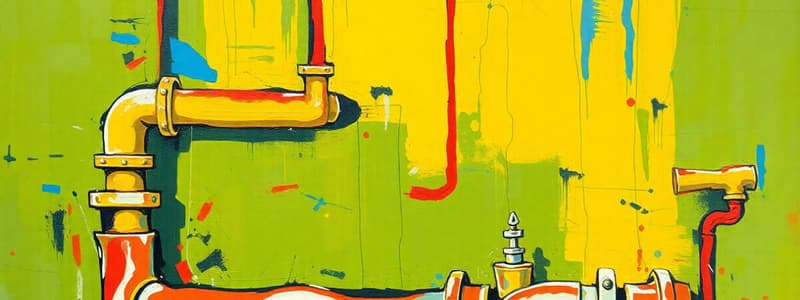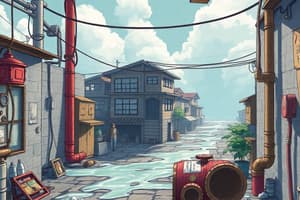Podcast
Questions and Answers
What does RNPCP stand for?
What does RNPCP stand for?
Revised National Plumbing Code of the Philippines
In what year was the Plumbing Code Committee created to amend the National Plumbing Code?
In what year was the Plumbing Code Committee created to amend the National Plumbing Code?
1994
What year was the Plumbing Code Review Committee formed to review the work completed by the Plumbing Code Committee?
What year was the Plumbing Code Review Committee formed to review the work completed by the Plumbing Code Committee?
1999
What are RNPCP's found to be in accordance with?
What are RNPCP's found to be in accordance with?
How many days does the RNPCP take effect after its complete publication?
How many days does the RNPCP take effect after its complete publication?
Where and when was the RNPCP issued?
Where and when was the RNPCP issued?
What century did the plumbing profession begin in the Philippines?
What century did the plumbing profession begin in the Philippines?
What was the primary task of Filipino plumbers in the 18th and 19th centuries?
What was the primary task of Filipino plumbers in the 18th and 19th centuries?
What is the meaning of "pueblos"?
What is the meaning of "pueblos"?
What was the name of the walled city established by the Spaniards as a model community?
What was the name of the walled city established by the Spaniards as a model community?
What century marked a significant leap in plumbing development in the Philippines?
What century marked a significant leap in plumbing development in the Philippines?
What was a major priority during the time of epidemics in the Philippines?
What was a major priority during the time of epidemics in the Philippines?
Who issued a letter of instruction regarding waste disposal in all municipalities?
Who issued a letter of instruction regarding waste disposal in all municipalities?
In what year was the plumbing trade officially recognized by the government?
In what year was the plumbing trade officially recognized by the government?
Which city was considered the model community?
Which city was considered the model community?
Who was the first chief of the Division of Plumbing Construction and Inspection?
Who was the first chief of the Division of Plumbing Construction and Inspection?
What Code was incorporated into the Building Code for the City of Manila?
What Code was incorporated into the Building Code for the City of Manila?
In what year did NAMPAP register with the SEC (Securities and Exchange Commission)?
In what year did NAMPAP register with the SEC (Securities and Exchange Commission)?
What initiated the creation of the Department of Public Services of the City of Manila?
What initiated the creation of the Department of Public Services of the City of Manila?
What is the City Ordinance 2441?
What is the City Ordinance 2441?
What association spearheaded the enactment of a law regulating the practice of master plumbing in the Philippines?
What association spearheaded the enactment of a law regulating the practice of master plumbing in the Philippines?
What House Bill was approved on the Third Reading?
What House Bill was approved on the Third Reading?
What year was RA 1378 signed by President Ramon Magsaysay?
What year was RA 1378 signed by President Ramon Magsaysay?
When was the National Plumbing Code of the Philippines promulgated and approved by Malacañang?
When was the National Plumbing Code of the Philippines promulgated and approved by Malacañang?
What does NAWASA stand for?
What does NAWASA stand for?
What year was the curriculum for Plumbing Engineering approved and first introduced at Feati University?
What year was the curriculum for Plumbing Engineering approved and first introduced at Feati University?
What was the first amendment to the National Plumbing Code?
What was the first amendment to the National Plumbing Code?
What plumbing material was approved as part of the National Plumbing Code amendment on November 28, 1967?
What plumbing material was approved as part of the National Plumbing Code amendment on November 28, 1967?
What is the Building Code of the Philippines?
What is the Building Code of the Philippines?
In what year did NAMPAP President Jaime M. Cabase spearhead the updating of the RNPCP?
In what year did NAMPAP President Jaime M. Cabase spearhead the updating of the RNPCP?
Who adopted the Revised Plumbing Code of 1999?
Who adopted the Revised Plumbing Code of 1999?
When was the Revised Plumbing Code approved by President Joseph Ejercito Estrada?
When was the Revised Plumbing Code approved by President Joseph Ejercito Estrada?
All premises intended for human habitation, occupancy or use shall be provided with a supply of pure and wholesome water, neither connected with unsafe water supplies nor subject to hazards of backflow or back-siphonage.
All premises intended for human habitation, occupancy or use shall be provided with a supply of pure and wholesome water, neither connected with unsafe water supplies nor subject to hazards of backflow or back-siphonage.
Plumbing fixtures, devices and appurtenances shall be supplied with water in sufficient volume and at pressure adequate to enable them to function satisfactorily and without undue noise under all normal conditions of use.
Plumbing fixtures, devices and appurtenances shall be supplied with water in sufficient volume and at pressure adequate to enable them to function satisfactorily and without undue noise under all normal conditions of use.
Plumbing shall be designed and adjusted to use the minimum quantity of water consistent with proper performance and cleaning.
Plumbing shall be designed and adjusted to use the minimum quantity of water consistent with proper performance and cleaning.
Flashcards
RNPCP
RNPCP
Revised National Plumbing Code of the Philippines.
1994
1994
The year when the committee to revise the National Plumbing Code was formed.
1999
1999
The year the Plumbing Code Review Committee was established to review the revisions.
Plumbing Materials and Practice
Plumbing Materials and Practice
Signup and view all the flashcards
30 Days
30 Days
Signup and view all the flashcards
September 30, 1999
September 30, 1999
Signup and view all the flashcards
17th Century
17th Century
Signup and view all the flashcards
18th and 19th Century
18th and 19th Century
Signup and view all the flashcards
Pueblos
Pueblos
Signup and view all the flashcards
Walled City
Walled City
Signup and view all the flashcards
20th Century
20th Century
Signup and view all the flashcards
Health and Hygiene
Health and Hygiene
Signup and view all the flashcards
Governor General Harrison
Governor General Harrison
Signup and view all the flashcards
1902
1902
Signup and view all the flashcards
City of Manila
City of Manila
Signup and view all the flashcards
John F. Hass
John F. Hass
Signup and view all the flashcards
Building Code for the City of Manila
Building Code for the City of Manila
Signup and view all the flashcards
NAMPAP
NAMPAP
Signup and view all the flashcards
1935
1935
Signup and view all the flashcards
Act of Congress
Act of Congress
Signup and view all the flashcards
City Ordinance 2441
City Ordinance 2441
Signup and view all the flashcards
NAMPAP
NAMPAP
Signup and view all the flashcards
1954
1954
Signup and view all the flashcards
June 18, 1955
June 18, 1955
Signup and view all the flashcards
January 28, 1959
January 28, 1959
Signup and view all the flashcards
NAWASA
NAWASA
Signup and view all the flashcards
1966-1969
1966-1969
Signup and view all the flashcards
November 28, 1967 (N2867)
November 28, 1967 (N2867)
Signup and view all the flashcards
November 28, 1967 (N2867)
November 28, 1967 (N2867)
Signup and view all the flashcards
RA 6541
RA 6541
Signup and view all the flashcards
1996
1996
Signup and view all the flashcards
Jaime M. Cabase
Jaime M. Cabase
Signup and view all the flashcards
Hermogenes P. Pobre
Hermogenes P. Pobre
Signup and view all the flashcards
December 21, 1999
December 21, 1999
Signup and view all the flashcards
Study Notes
Plumbing Code of the Philippines - History and Principles
- Revised National Plumbing Code of the Philippines (RNPCP): A set of rules and regulations for plumbing work.
- 1994: A committee was formed to amend the National Plumbing Code.
- 1999: A review committee was established to examine the plumbing code's revisions.
- Plumbing Materials and Practice: The RNPCP follows modern technologies in materials and methods.
- 30 Days: The RNPCP takes effect 30 days after publication.
- September 30, 1999: The RNPCP was issued in Manila, Philippines.
- 17th Century: The Filipino plumbing profession began in Philippines.
- 18th and 19th Centuries: Filipino plumbers maintained/repaired plumbing systems in towns and buildings.
- Pueblos: Towns in the Philippines.
- Walled City: Intramuros, where the Spaniards established a model community.
- 20th Century (early): The arrival of foreign influences led to advancements in Plumbing.
- Health and Hygiene: A priority needing advancement when epidemics occurred in Philippines.
- Governor General Harrison: Issued a letter of instruction on waste disposal.
- 1902: Plumbing trade was formally recognized.
- City of Manila: Served as a model community.
- John F. Hass: Became the first Chief of Plumbing Construction & Inspection.
- Building Code for the City of Manila: Incorporated plumbing of the U.S.A.
- NAMPAP (National Master Plumbers Association of the Philippines): A plumbing professional association.
- 1935: NAMPAP registered with the SEC.
- Act of Congress: Created the Department of Public Services in Manila.
- City Ordinance 2441: The initial Manila Plumbing code.
- 1954: Approved House Bill (HB) 962 for the National Plumbing Code.
- June 18, 1955: President Ramon Magsaysay signed RA 1378.
- January 28, 1959: The National Plumbing Code was promulgated and approved by Malacañang.
- NAWASA: National Waterworks and Sewage Authority.
- 1966-1969: First introduction of Plumbing Engineering curriculum in Feati University.
- November 28, 1967 (N2867): First amendment to the National Plumbing Code, approving Asbestos-Cement Pipe.
- RA 6541: The Building Code of the Philippines.
- 1996: NAMPAP updated the RNPCP.
- Jaime M. Cabase: NAMPAP's President for the updating.
- Hermogenes P. Pobre: Adopted the Revised Plumbing Code of 1999.
- December 21, 1999: President Estrada approved the revised code.
RNPCP Principles
- The Code ensures safe and healthy plumbing systems.
- Focuses on water supply, water usage, heating, connection to sewers, waste disposal and ventilation.
- Principles 1 to 22 define criteria to achieve this.
Studying That Suits You
Use AI to generate personalized quizzes and flashcards to suit your learning preferences.
Description
Explore the history and foundational principles of the Revised National Plumbing Code of the Philippines. This quiz covers key events, the evolution of plumbing practices, and the influence of modern technologies in the field. Test your knowledge on how plumbing has developed from the 17th century to the present day.




